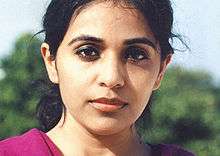Rupa Bajwa
Rupa Bajwa (born 1976) is an Indian writer who lives and works in Amritsar, Punjab as well as spending time in various other Indian cities and towns. She is a recipient of the Grinzane Cavour Prize, the Commonwealth Award, and India's Sahitya Akademi Award.
Rupa Bajwa | |
|---|---|
 | |
| Born | 1976 (age 43–44) Amritsar, Punjab, India |
| Language | English |
| Notable awards |
|
Novels
In 2004, she published her first novel, The Sari Shop, which explores her hometown and the class dynamics of India.[1] The novel won the writer flattering reviews, with reviewers calling her India's new literary find. The Sari Shop was long listed for the Orange Prize for Fiction in 2004. The novel won the XXIV Grinzane Cavour Prize for best first novel in June 2005, the Commonwealth Award in 2005 and India's Sahitya Akademi Award English 2006. The Sari Shop has been translated in several languages, among them: French ( Le vendeur de saris), Dutch (De Sariwinkel) and Serbian (Prodavnica sarija).
Rupa Bajwa's second novel, Tell Me a Story, was released in April 2012. It was met with extreme reactions. It received critical appreciation from some quarters, at the same time creating controversy among the literary circles in New Delhi, since a part of this novel lampooned these very people.[2]
Currently, Rupa Bajwa is working on her third novel.[3][4][5]
Columns
Though she is from a Sikh family, Bajwa wrote a controversial piece called "Dark Things Do Happen in Gurdwaras Sometimes", in The Daily Telegraph, an Indian newspaper.[6]
Rupa Bajwa also writes book reviews and articles on other interests in The Telegraph, The Tribune, Time Out and India Today.
Works
- 2004 The Sari Shop
- 2012 Tell Me a Story
Further reading
- For a post-colonial perspective on Bajwa's award-winning-novel,The Sari Shop, one can consult the Raiganj University Professor Pinaki Roy's "Multicultural Differences: A Brief Rereading of Rupa Bajwa's The Sari Shop", in the Ketaki Dutta-edited Sahitya Akademi Award-winning English Collections: Critical Overviews and Insights (New Delhi: Authors Press, 2014, ISBN 978-81-7273-728-3), pp. 272–86.
References
- Sood, Ashima. "THE EMIGRANT AND THE NATIVE: the Indias of Akhil Sharma and Rupa Bajwa". Another Subcontitent. Retrieved 3 January 2012.
- http://www.goodreads.com/book/show/13631169-tell-me-a-story
- Singh, Roopinder (22 May 2004). "Write recipe". The Tribune. Retrieved 3 January 2012.
- http://www.dnaindia.com/lifestyle/review_book-review-tell-me-a-story_1682029
- http://www.thehindu.com/arts/books/article3483287.ece
- Bajwa, Rupa (6 February 2005). "Dark Things Do Happen in Gurdwaras Sometimes". Sikh Times. Retrieved 3 January 2012.